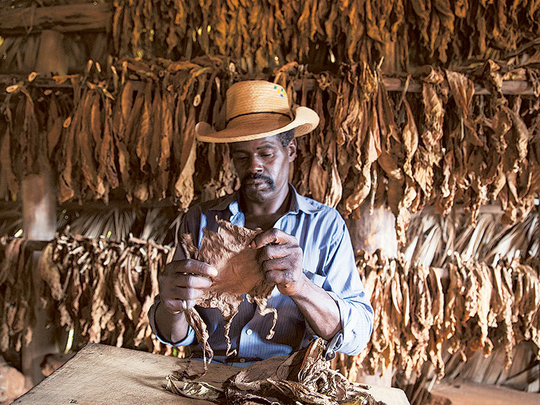
Washington: President Barack Obama on Friday issued a sweeping directive to enshrine his administration’s historic opening with Cuba well beyond the end of his presidency, setting a new policy to lift the embargo that codified the Cold War rupture as he ended restrictions on importing Cuban rum and cigars.
The action formalises the shift toward normalisation that the president unveiled nearly two years ago with the announcement that he and President Raul Castro of Cuba had secretly agreed to repair their countries’ relationship. Obama was using executive power to transform what has been one of his top foreign policy priorities — and a vivid example of his strategy of engaging with former adversaries — into a set of official mandates that could shape US policy toward Cuba for years to come.
Obama on Friday also made what aides said were likely his final major modifications to loosen US sanctions on Cuba before leaving office, including lifting the $100 limit on bringing Cuban rum and cigars into the United States. The revisions will also allow Cuban pharmaceuticals to be approved by the Food and Drug Administration and imported into the United States, permit online retailers to sell goods in Cuba and allow credit financing for the sale of agricultural goods, such as tractors and pesticides, to Cuba.
“I thought that might wake some of you up,” Susan Rice, the president’s national security adviser, told an audience in a speech here Friday as she outlined the policy changes. “You can now celebrate with Cuban rum and Cuban cigars.”
The changes are an attempt by Obama to press forward with his thaw with Cuba even in the face of lingering opposition in Congress to repealing the embargo. The 12-page document he approved on Friday does not erase the laws restricting tourism and trade — only a vote of Congress can do that — but it declares the legislation at odds with US. policy, and requires that the administration lobby Congress to eliminate it.
Opponents of the opening, including some Cuban-American lawmakers who have characterised the policy as a concession to a brutal autocratic regime that denies its citizens basic human rights, swiftly denounced the latest move.
“Today’s announcement reaffirms the fact that President Obama’s Cuba policy puts the Castro regime’s interests first, profits ahead of America’s national security and the Cuban people’s rights and dignity dead last,” Sen. Marco Rubio, R-Fla., said Friday.
Yet support is growing on Capitol Hill for the approach, and it would take another directive by a future president to reverse Friday’s move, something that Obama’s top advisers argued would be difficult for a successor; they say the shift is already reshaping the way Americans travel to and do business with Cuba.
“This directive takes a comprehensive and whole-of-government approach to promote engagement with the Cuban government and people, and make our opening to Cuba irreversible,” Obama said in a statement. “Challenges remain — and very real differences between our governments persist on issues of democracy and human rights — but I believe that engagement is the best way to address those differences and make progress on behalf of our interests and values.”
The publication of the document — an unclassified directive that lays out the specific goals and strategy for US engagement with Cuba — was significant after decades of secrecy and mistrust overhanging the relationship. “We are not seeking to impose regime change on Cuba,” the directive reads, asserting that “the embargo is outdated and should be lifted.”
As if to underscore a stark shift from the spying and suspicion of the past, the document specifically requires that US-led “democracy programs” — which the Castro government has denounced as secret efforts to destabilise the country — be “transparent.”
“The United States used to have secret plans for Cuba; now our policy is fully out in the open and online for everyone to see and read,” Rice said in her speech Friday. “What you see is what you get.”
The latest regulatory changes, which take effect Monday, leave in place restrictions on agricultural and many other imports from Cuba, and a bar on Cuban banks opening accounts in the United States, which makes financial transactions between the two countries unwieldy.
The current $400 limit on the amount of Cuban merchandise that can be brought into the United States, however, will be eliminated, and with it, the cap on rum and tobacco products. The change bears practical and symbolic significance for a country that prides itself on its cigars and rum, both industries controlled by the government, whose popularity have become a symbol for the lasting strictures of the embargo.
During secret talks in Canada to seal the initial agreement on normalisation, Cuban officials would routinely bring boxes of Cuban cigars and bottles of Havana Club rum to their US counterparts, gifts that served as implicit criticism of the embargo that barred Obama’s team from bringing them home to enjoy. President John F. Kennedy dispatched his press secretary, Pierre Salinger, to horde 1,000 Cuban cigars for his private stash before signing the executive order instituting the trade embargo, according to a 1992 article Salinger wrote in Cigar Aficionado magazine.












